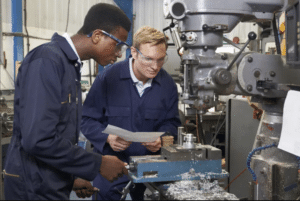Top 5 Traits You Should Look for When Filling Your Next Machinist Job
Michelle Gaba | Hiring Advice, Manufacturing & Engineering | October 11, 2019

It’s not easy for manufacturing and engineering firms to find the right fit for their open machinist job. These skilled professionals are in high demand and enjoy many work opportunities. With that said, employers still need to be careful that they don’t “settle” for just anyone. A machinist’s work is critical to their company’s success, so careful vetting of candidates is necessary.
Here Are Five Traits That Hiring Managers Should Consider Before Extending a Machinist Job Offer:
-
Mathematical Knowledge
Indeed, machinists aren’t engineers. However, they do create components and tools based on engineers’ designs, specifications, and drawings. So, machinists need to have a strong knowledge of mathematics to understand the engineer’s vision and make it a reality.
When assessing a machinist job candidate’s mathematical knowledge, employers should focus on practical applications rather than abstract concepts. Fundamental knowledge of math is needed for their daily work. But, remember these employees are not theoretical physicists tracking the gravitational pull of a black hole!
-
Detail Oriented
Mathematical aptitude and giving attention to detail often go hand in hand, but not always. The quality of being detail oriented is partially a personality trait and also a sign of work ethic. A mathematical whiz may still lose track of details if they’re prone to laziness or “taking the easy way out.”
Machinists are expected to create precise components and tools with tight tolerances. There’s little room for error, and mistakes are costly. Flubs will happen on occasion, but detail-oriented workers mitigate the risk.
-
Adaptability
Anyone who’s worked in engineering or manufacturing for more than a few years knows industry technology evolves rapidly. It wasn’t that long ago when machinists worked without the assistance of any computerized systems whatsoever. As computers continue to play a bigger role, machinists will need to adapt further.
It’s important to remember, however, that career evolution isn’t limited to the young. Many older workers are also capable of learning new technologies. Employers should never discriminate based on age but rather assess each candidate case by case through direct questioning.
-
Strong Communication
While outsiders may think of machinists as secluded workers, nothing could be further from the truth. These professionals must communicate regularly with engineers in order to breathe life into drawings and designs. Employers should be careful not to fill their machinist job opening with a sullen candidate or someone who “doesn’t play well with others.”
-
Organization & Prioritization Throughout the Machinist Job
As with communication, the “soft” skills of organization and prioritization are also critical for successful machinists. They may be required to work on multiple projects at once and must meet the demands of many colleagues.
A machinist who makes quick decisions and properly focuses on critical projects first contributes greatly to a company’s success. Similarly, organized machinists save countless hours by streamlining processes and limiting costly redundancies.
Ultimately, a machinist job requires a technical worker who can apply practical knowledge to create tools or components. This fundamental reality will never change. Manufacturing and engineering companies that assess machinist job candidates for other critical traits will make better hires!
If you’re seeking top-notch machinists, engineers, or other manufacturing professionals, consult with the industry’s best recruiting firm today!
The Top Industry Professionals are Just a Click Away!
If you are looking to hire and need help sourcing great candidates quickly, connect with Goodwin Recruiting.
Share This Article







































